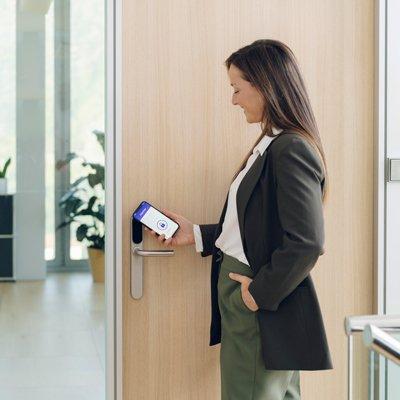 |
| Smart, secure and innovative, XS4 provides a totally wire-free networked electronic access control solution |
A brand new high tech research building at Ireland's Cork Institute of Technology has been equipped with SALTO's wireless XS4 access control system to create a totally keyless environment.
Research is a core dimension of CIT and all main research activity is primarily (though not exclusively) organised around three strategic research clusters. One of these is the new Nimbus Centre for Embedded Systems Research, which has been awarded a major research and infrastructure grant from Ireland's Higher Education Authority's Programme for Research in Third-Level Institutions (PRTLI) to establish a national facility for Networked Embedded Systems (NES) research and the Internet of Things.
The infrastructure grant has provided a two floor 1,805m2 building with accommodation for up to 90 researchers and support staff, state-of-the-art hardware development laboratories, teaching and learning facilities, and spaces for knowledge transfer and interaction with industry. The building also includes a large and adaptable demonstration space which allows for practical demonstrations of NES applications arising out of the research carried out in the building.
Besides the electronic door hardware, the heart of the new access control system is its SALTO Virtual Network (SVN) software |
Monitoring of large scale phenomena such as energy consumption, pollution, weather and global warming is also possible with NES. The EU, OECD and the Irish government have all identified the Internet of Things as a key technology for future industrial and social development as they recognise that, just as the current Internet has changed our lives beyond recognition in little more than 20 years, the Internet of Things will bring about changes that we are only now only beginning to imagine and will create major opportunities for innovation, enterprise and employment.
"As the leading global provider of advanced technology security solutions to the education sector, the XS4 system was the ideal choice for this important new building at Cork Institute of Technology," comments Kieran Gorey from Doorware Ltd, SALTO's Irish Independent Business Partner.
"Working in consultation with the institute we designed a highly secure and flexible ‘keyless' intelligent access control system to meet all their needs. Managing access of staff and visitors to and within such an important scientific building was absolutely crucial and to achieve it a ‘secure one card solution' was to be the key application."
The access control system greatly reduces the number of visits necessary to offline doors, since user data is simply transferred on cards by normal use |
In order to achieve this and create a truly intelligent building that could be totally keyless, a secure system was needed to control access via Mifare contact-less smart cards which would also double up as photo ID cards. It would also need to deliver everything that a secure hard wired system would provide but more cost effectively and in a mix of on-line and off-line stand-alone wire free formats.
"The requirement was demanding as absolute reliability was required, but working in consultation with Aidan McDonald, IT Projects Manager at Cork Institute of Technology, we designed and subsequently installed a highly secure and flexible access control solution using the SALTO XS4 system. This now secures 50 online and offline doors at key points of entry to and within the building, all controlled via hot spot wall readers," Gorey continues.
Wire-free control
Smart, secure and innovative, XS4 provides a totally wire-free networked electronic locking solution. It is designed around state-of-the-art RFID electronics that use distributed intelligence to pass information between microprocessors in the electronic handle set and the key card.
SALTO's access control system also eliminates the physical restrictions of traditional stand-alone electronic locks |
Besides the electronic door hardware, the heart of the new access control system is its SALTO Virtual Network (SVN) software. This enables locks and key cards to be updated remotely and access profiles to be changed rapidly adding real value to the access management of the building. It also eliminates the physical restrictions of traditional stand-alone electronic locks and can seamlessly integrate with other third party systems to allow ID cards and locks to be updated, restricted or deleted remotely.
The ‘smart' ID cards build up 'on-card' audit trails through normal use giving Cork Institute of Technology complete control over access and enabling them to track the movement of staff and visitors through both the offline and online parts of the system if required. This enables a complete access profile of each individual to be established and updated as necessary at the updater or ‘hot spot' wall readers.
Any ID cards that get lost or stolen can be quickly and simply deleted from the system just by visiting the readers with up-dated cards. The system also greatly reduces the number of visits necessary to offline doors, since user data is simply transferred on cards by normal use. This eliminates the traditional need to replace locks if security is breached due to the loss or theft of an ID card.
Aidan McDonald says: "The new SALTO access control system enables us to manage the security needs of this new cutting-edge research building in a controlled way. Having security that is reliable and dependable is obviously key for us, so the flexibility of the access control system means we can get the maximum benefit from the technology whilst providing a secure environment for all researchers and support staff working within it. The wireless nature of the access control system was particularly attractive to the researchers as it contributes to the ‘wireless nature' of the building, where a range of embedded systems, including the access control system, are wirelessly networked."

















